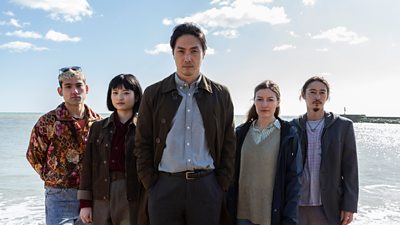Interview with Julian Farino
Interview with Julian Farino, lead director and executive producer of Giri/Haji.

Doing the Battle of Soho was a little scary. You want it to feel authentic, but obviously you’re not really gonna have that level of gunfire in the centre of town, so you have to acknowledge it’s a slightly heightened thing.
How was the experience of shooting Giri/Haji in both England and Japan?
It was kind of a monster shoot: 104 days of filming for me, across eight months. It was a biggie. But it was enjoyable. Partly the pleasure of working with the Japanese crew and actors. They were fantastic, just a completely different sensibility, and it was a fresh experience for them, too. They weren’t used to filming the way that we film. And you know what? Across that 104 days, you could probably count the fluffs in delivery of lines on the fingers of one hand. I mean, they were immaculate. So yeah, it was very alive as a shoot. I felt we were exploring stuff. It wasn’t like, oh let’s just knock it out. Everything needed some sort of calibration.
Why did you feel Giri/Haji demanded that of you as a director?
Well, it’s quite a tricky one to define, isn’t it? Kind of a quest for tone, because it’s genre and yet not genre. It’s under the guise of a thriller, but I really think it’s more about Kenzo’s (Takehiro Hira) love for his family. For me, the essential thing, if I fell back on anything as the main story, it would be the tragedy of the brothers, Kenzo and Yuto (Yôsuke Kubozuka). That underpinned everything. But then you’ve got this incredibly unlikely ensemble of characters, with a 16 year-old Japanese teenager and a rent boy from Soho, and a policewoman with a sort of moral grey area hanging over her. It’s a great line-up. You never felt that you were just churning out anything.
There is a lot of action in the series, including the huge 'Battle of Soho' shoot-out in episode four. How did you deal with that?
I haven’t really done action on this scale before. Doing the Battle of Soho was a little scary. You want it to feel authentic, but obviously, you’re not really gonna have that level of gunfire in the centre of town, so you have to acknowledge it’s a slightly heightened thing. I welcomed the challenge, because if you look at Hollywood, there’s so much gratuitous action. The question was, how do we stage this sequence which is so ambitious in its length without it feeling like it’s just gunfire? How do you keep the characters at the foreground?
I thought of those kind of ChildrenOof Men-type experiences, where you felt you’re in the middle of something, but you’re in it with somebody. It wasn’t just a shoot-out. I looked at that, and I looked at that brilliant sequence in the first season of True Detective, where it had a kind of grandeur to it, in the way it was a single shot of brilliant staging, a sort of first-hand experience.
What were the challenges of shooting on location in Tokyo?
We did about ten weeks in Tokyo and it was an enormous challenge. Because in Japanese culture you don’t ever want to intrude, or impinge on people's space. It is really hard to get permission to do anything - you’re never sure that you can park a car here, or put a light there, because there’s quite a lot of people that you’re going to have to try and communicate with. So it’s a little bit seat-of-the-pants. Everything was a little bit, okay, we’ll find a couple of rooms here, and then we’ll get some food from this restaurant, and the actors can change in the restaurant toilets. It was all quite improvised. You had to stay flexible.
Joe Barton’s script seems to bust the clichés you usually get in culture-clash thrillers about the Japanese, such as in films like Black Rain, or Rising Sun. How did that bear out in the making of Giri/Haji?
Well, it afforded us the pick of Japanese actors. We didn’t realise when we went casting over there that we were getting these movie stars. Masahiro is an absolute national treasure who has done a million movies. And the reason we got such a great quality of actors was they all said it was fantastic to see a script coming out of the West where you feel they’re not token Japanese characters. They’re living, breathing people.
Do you think there’s scope for further series, and would you like to come back and further explore these characters?
I’m sure there is scope. I don’t think you want to lose these enjoyable characters. I’ve no idea how Joe will do it, and to be honest I haven’t had too much time to think about it. But I learned while working in America that you want things to grow. In the UK, we tend have a history of, 'oh you do one season and then that’s it' and then it goes downhill. But in a modern age when shows are built over several seasons, you think of the opportunity for scope and growth, and there’s enough originality in Giri/Haji that you hope Joe keeps it going.
Pictured: Rodney (Will Sharpe), Taki (Aoi Okuyama), Kenzo Mori (Takehiro Hira), Sarah Weitzmann (Kelly Macdonald), Yuto (Yosuke Kubozuka)
The Legend Of Giri/Haji
“Let me tell you a story. It
starts with Kenzo Mori. A Tokyo
detective, living a quiet life...
Until his younger brother comes to
him for help. Yuto. The black sheep
of the family. He’d done something
very stupid. But, as it turns out,
not everything can be fixed. Fast
forward a year and Yuto is dead.
Just another Yakuza that met his
end in a hail of bullets. Except
maybe not... Because as Kenzo is
about to find out, the past has a
way of coming back to haunt you.
Rumours start to circle that the
younger Mori brother may be alive
and living in a far-off land. And
soon Kenzo is on a journey to see
for himself. Kenzo and Yuto. A
killer and a saviour. But which is
which? Now, trouble follows Kenzo
everywhere he goes, but so, as it
turns out, does his daughter -
Taki. Sixteen years old. A brave
girl who befriends a lost boy.
Rodney. Half Japanese, half
English. He thinks if he talks loud
enough he won’t be able to hear his
demons. But he doesn’t know yet
just how loud they can scream.
On his way looking for his brother
Kenzo meets Sarah. Another cop
trying to escape something she
can’t outrun. Two people in a city
of eight million and they find each
other. So I suppose this isn’t just
a story about death. It’s a story
about life. And love. And
heartbreak. About the split second
decisions that we make and the
things we lose and win as a result.
It’s a story about gangsters.
(Abbot and Fukuhara)
Killers.
(Donna and Jiro)
Cowards.
(Vickers)
And heroes.
(Rei, Natsuko, Eiko,
Toshio)
It’s about two brothers. Engulfed
in chaos.”
